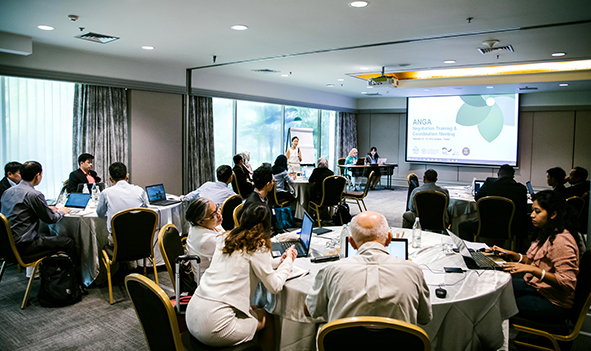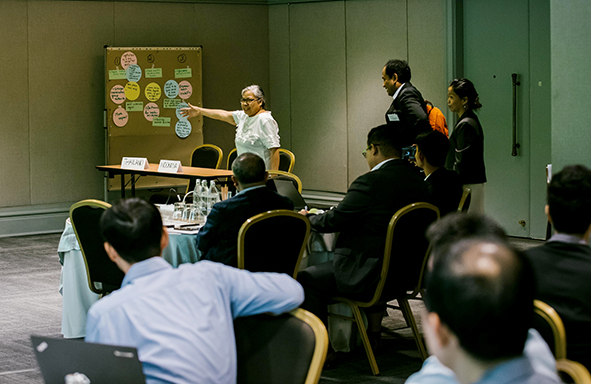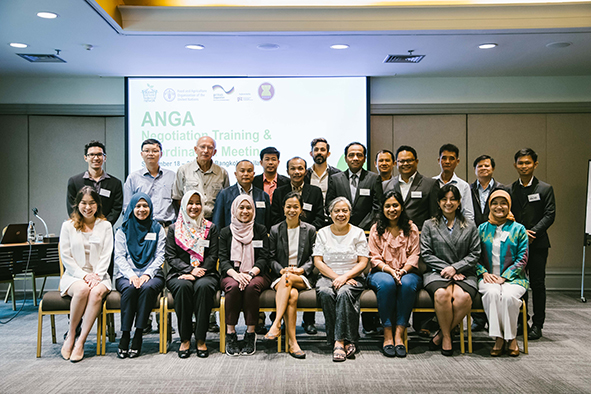
Bangkok, Thailand—Some twenty-two participants attended a three-day workshop on the ASEAN Negotiating Group on Agriculture (ANGA) coordination meeting and United Nations Convention on Climate Change (UNFCCC) negotiations training in Bangkok, Thailand from 18 to 20 September 2019.
The meeting, chaired by the Ministry of Agriculture and Rural Development of Viet Nam, aimed to facilitate preparation and coordination of ASEAN Member States (AMS) in developing joint positions with a specific focus on Koronivia Joint Work on Agriculture (KJWA), as well as to strengthen the capacities of AMS for engaging in climate governance frameworks.
In his opening speech, Dr. Pham Quang Huy, Deputy Head of Division of the Department of International Cooperation, Ministry of Agriculture and Rural Development of Viet Nam, who is the outgoing Chair of ANGA, highlighted the importance of strengthening agriculture’s momentum and involvement in the climate governance frameworks.
The three-day workshop started with the ANGA coordination meeting, which enabled the representatives of AMS to review the updates on KJWA from the last negotiation sessions (SBSTA 50 & SBI 50). The two following days focused on enhancing negotiation skills and regional common positions for the upcoming COP.
ANGA coordination meeting
Participants shared common views on ANGA as a strategic platform for voicing unified positions on agricultural issues where each member state in the region still has the opportunity to express their own relevant contexts.
Furthermore, the participants shared their views on how to advance ANGA as a negotiation group amid the UNFCCC structures and other potential multilateral environmental agreements. In the past, ANGA has contributed to delivering ASEAN regional common submissions promoting the involvement of the agriculture sector in UNFCCC negotiations.
The participants also discussed the upcoming topic for discussion at the New Zealand Workshop on sustainable land and water management. This includes integrated watershed management strategies to ensure food security. The discussion touched on the needs to scale up implementation of best practices, innovations and technologies that increase resilience and sustainable production in agricultural systems according to national circumstances.

Photo credit : @GIZ/ Chat Dulyarat
Negotiation training
During the one-and–a-half days of training, the participants attended workshops on enhancing effective contributions to the negotiating process.
The participants in the training sessions were representatives nominated by the ASEAN Working Group on Climate Change (AWGCC) and the ASEAN Working Group on Forest and Climate Change (AWGFCC), who joined the previous day’s ANGA focal points.
The aim was to allow other ASEAN negotiators to benefit from ANGA’s experiences and capacity development activities. The training showcased a typical day of COP and its possible dynamics for participants’ anticipation. Furthermore, during the exercise, the participants practised simulation negotiation processes with tools and materials available for use. Several exercises were set up to allowthem to focus on drafting text for interventions, decisions and other written outcomes of the negotiation process.

Bangkok, Thailand, 18 to 20 September 2019.
Photo credit : @GIZ/ Chat Dulyarat
The outlook
While ANGA plays a crucial role in agreeing on a common regional position, participants also discussed challenges regarding the full engagement of ANGA, such as ensuring the continuity of the focal points. All the participants reflected carefully together on how to further improve cooperation within ANGA and developed a draft negotiation framework for ANGA.
A draft negotiations framework is a document that spells out the scope of ANGA’s mandate by defining its identity, the challenges it aims to address, and the approaches ANGA employs. This framework will be communicated to the Senior Official Meeting of the ASEAN Ministerial Meeting on Agriculture and Forestry (SOM-AMAF) to seek endorsement.
Alongside the ASEAN member states and the ASEAN secretariat, development partners including the recently established Climate Smart Land Use in ASEAN (CSLU) project, funded by the German Federal Ministry for Economic Cooperation and Development (BMZ) and implemented by the Deutsche Gesellschaft für Internationale Zusammenarbeit (GIZ) GmbH, as well as the United Nations Food and Agriculture Organization (UN-FAO), will continue to assist the negotiation group incontributing negotiation processes in the international forums.
All photos : @GIZ/ Chat Dulyarat